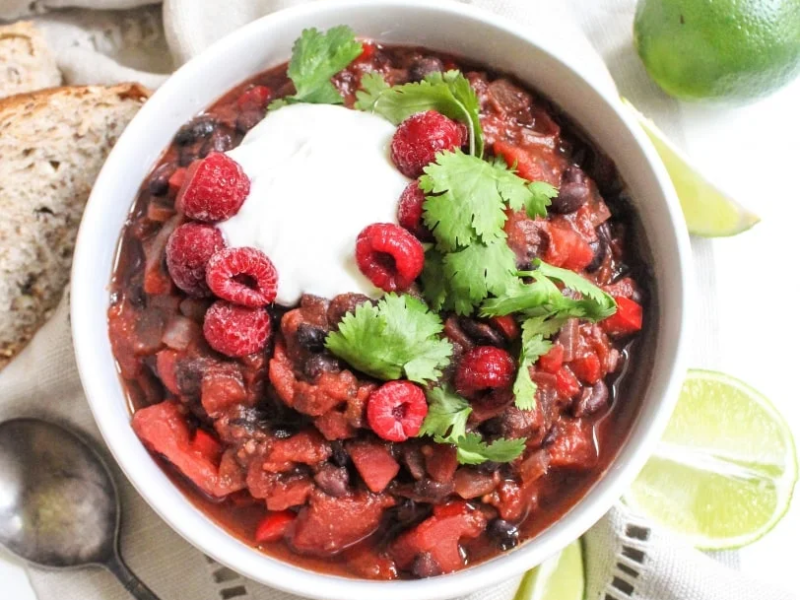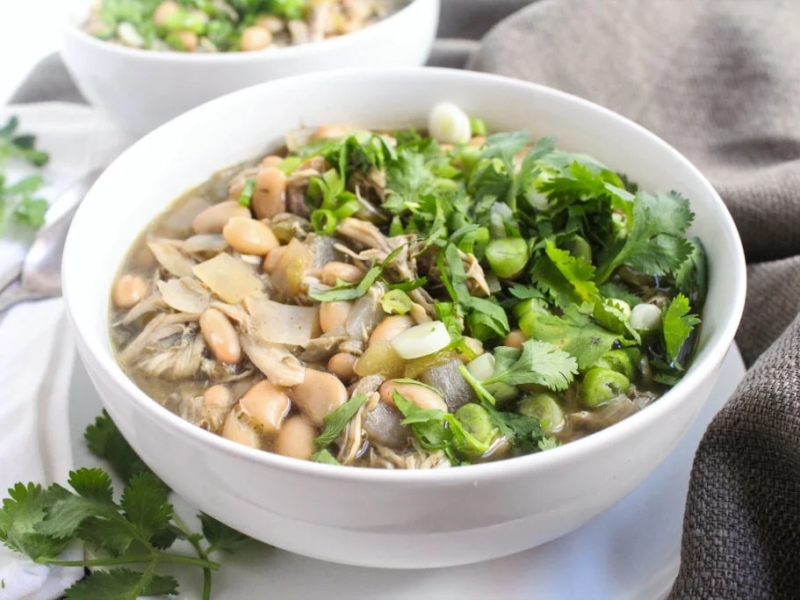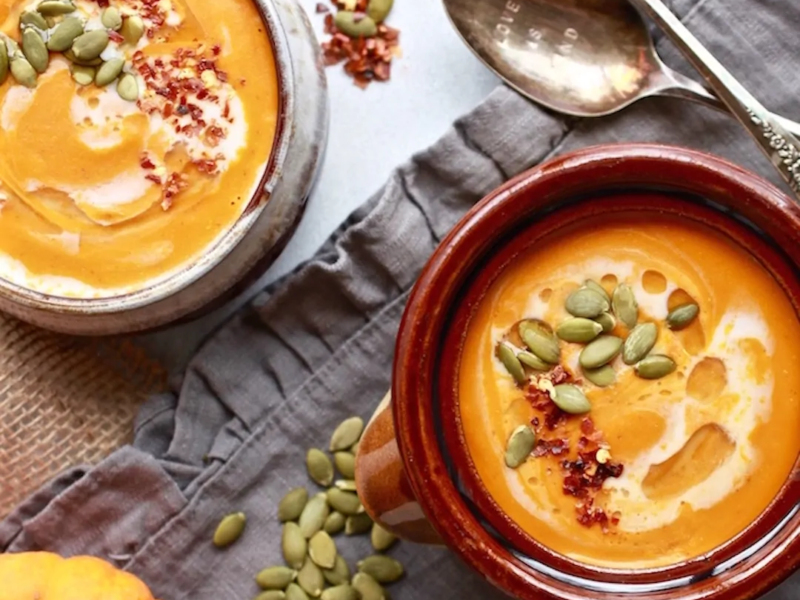
The dishes they eat, family traditions, and where Portlanders can find holiday food
Rosh Hashanah, the Jewish New Year, is a time for celebration, reflection about the previous year, and intention setting for the year ahead. Families gather to eat apples dipped in honey — signifying a sweet new year — and blow the shofar, a musical horn typically made from a ram’s horn. Although Portland’s Jewish food scene is not as robust as cities like Chicago and New York City, dishes traditionally eaten on Rosh Hashanah, like tzimmes, loaves of round challah, and honey cake, can still be found around town. Eater Portland talked to Portland chefs and restaurant owners about their Rosh Hashanah traditions, including the dishes they make and how they celebrate. Interview responses have been edited and condensed for clarity.
“As a little one, I used to go with my family to dinners at Gesher, where magnificent vegetarian potluck dishes in various states of readiness would cover the surfaces of the whole kitchen, and there would be lots of teachings and blessings from Rabbi Gary and Rabbi Laurie, and I always used to run off to find costumes and sing Broadway songs with their daughter Avital. This year, I will try to score some Mountain Rose apples, slice them, pour a generous measure of the special honey I squirreled away from [Malka regulars] Victoria and Bryan — they keep bees! — and I’ll put it all out on the metro rack behind the dish pit where we share our snacks and treats every day. Rosh Hashanah and apple slices always remind me of being a kid going back to school and hoping it was gonna be a great year. I have hopes for this year more than ever.” —Jessie Aron, Malka
“My family celebrates by making sure to have dinner together and although the things on the table differ from year to year, having apples dipped in honey and a round challah are must-haves. Regarding procuring ingredients, I do try to head out to Hood River to pick apples beforehand and try to get a very special honey for the occasion. I really love the Arashan White Honey from Kyrgyzstan that we have at Lavka and that is what I will probably use this year, but I almost always buy local honey whenever I’m traveling because it’s such a great way to capture the terroir. A round challah is also something we make sure to procure, and honestly, Lavka started making them expressly because it is so hard to get a nice challah in town, so we just started baking them ourselves. We always sell braided challahs on Fridays at Lavka, but we make them round just for Rosh Hashanah, to symbolize the circular nature of the year. Besides dinner together, our family also tries to make sure to go to synagogue to hear the shofar. We aren’t very religious, but I do like the intention setting and reflection that come with Rosh Hashanah and Yom Kippur very much.” —Bonnie Morales, Kachka
“For Rosh Hashanah every year, while other families tend to emphasize the fruit of the apple, we go full pomegranate. Not to say we don’t always grab a variety of apples from Kiyokawa Family Orchards to dip in local honey or for the adults, honey from the Barreled Bee, but in our house we are fanatic for pomegranate. We hold off buying them until right before the holiday, and when the kids see them, they know the new year is coming. Jewish tradition teaches that the pomegranate is a symbol of righteousness, knowledge, and wisdom because it is said to have 613 seeds, each representing one of the 613 mitzvot (commandments) of the Torah. When many Ashkenazi Jews have brisket, every year, I make Fesenjan, a Persian chicken stew slowly cooked with ground toasted walnuts and pomegranate molasses. Dipping freshly made challah (round of course for the holiday) into that… yum. We also have a tradition of gathering with other Jews in the neighborhood after services on Rosh Hashanah day.” —Sonia Marie, Leikam Brewing
“Ordinarily, I’d be going on and on about all the foods central to this or that holiday, their origins, why I’m excited to prepare them and with whatever slant I’m exploring that year. Sure, I love brisket, round challah, honey cake and tzimmes as much as the next Jew, but truthfully, the High Holidays have always been about taking time to think about how I interact in the world, how I could do better, and about reinforcing my connection to some of the fundamental elements of being Jewish. We Jews love our food — so much so it seems like sometimes, it’s ONLY about the food. But during this time of year, I get so much more enjoyment seeing my kids laughing when I attempt to blow the shofar, or the excitement in their eyes when they get to make a mess with the apples and honey than I do from any brisket, no matter how good it is. These holidays, for me, are the only time when the food is the supporting role. If the food is great, it is simply a nice surprise, while we stand around with friends and family, talking loudly over each other while our kids run around creating chaos, until we finally have to take them home after the honey rush hits its peak.” —Noah Jacob, Jacob & Sons
“I grew up in the Detroit area which has a big Jewish population, so when the High Holidays come around you can really feel it there, which is so special to me. We would celebrate with big dinners with family friends, my mom and I would make brisket, matzoh ball soup, sweet noodle kugel, honey cake — all the Ashkenazi classics — plus a round raisin challah from the neighborhood bakery. Portland doesn’t have the same hustle and bustle when the Jewish holidays approach, so I try to bring it to my own house and to my community as much as possible. I love to host Jewish holidays, so after I deliver to-go holiday meals for my business, my wife and I go all out for a lovely meal with our friends and family. We do a special table-scape with candles and flowers and foliage, and serve a big meal of matzoh ball soup, brisket that reminds me of my childhood, and lots of Pacific Northwest veggies to round it all out. I still like to have the honey cake my mom made every year, but now we also serve a salted honey pie, which is perfect to bring in a sweet new year.” —Risa Lichtman, Lepage Food & Drinks
Where to Find Festive Food for Rosh Hashanah in Portland
Baker and Spice: The Hillsdale bakery’s crown challah loaves are sold out, but honey bee cakes and rugelach are still available for pickup on Sunday, September 25.
Address: 6330 SW Capitol Highway
Grand Central Bakery: The Pacific Northwestern bakery chain is baking crown-shaped challah loaves studded with red flame raisins. They’re available for pre-order with pickup available from September 24-26.
Address: All seven Portland-area Grand Central locations
Jacob and Sons: Noah and Dori Jacob’s delicatessen pop-up is offering a menu of High Holiday family meals and a la carte dishes including sweet and sour braised brisket, tzimmes, and sweet noodle kugel. Pre-orders close at the end of the day on Wednesday, September 21. Additionally, some of Jacob and Sons’ Rosh Hashanah items can be found at Zupan’s stores.
Address: 337 NW Broadway
Kachka Lavka: Bonnie and Israel Morales’ Eastern European restaurant is offering a take-home menu — with offerings like apple pie vareniki dumplings and chopped chicken liver — for pickup on September 24 and 25, with many of the same dishes available for dine-in at Kachka from September 24 through September 26.
Address: 960 SE 11th Avenue
Leikam Brewing: The Kosher brewery has launched a new beer for Rosh Hashanah — Major Pom is a pomegranate blonde ale made in collaboration with the Seattle-based Muriel’s All Day Eats.
Address: 5812 E Burnside Street
Lepage Food & Drinks: Chef Risa Lichtman is offering a menu packed with traditional flavors, including matzo ball soup, pomegranate molasses chicken, round raisin challah, and honey cake. Orders close Thursday, September 22.
Address: Pickup is located near NE 60th Avenue and NE Killingsworth Street, with a delivery option available in the North, Northeast, and Southeast quadrants of Portland.
This year, Rosh Hashanah will be celebrated from the evening of Sunday, September 25 through the evening of Tuesday, September 27.





